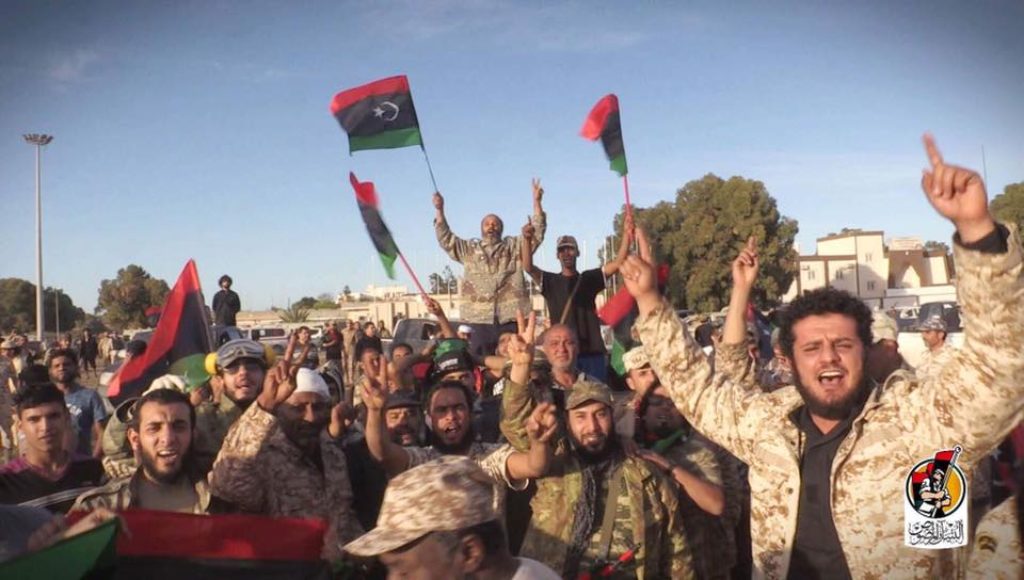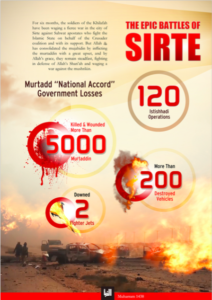
The Islamic State appears to have lost its final piece of turf inside the Libyan city of Sirte, according to the Department of Defense.
Pentagon spokesman Navy Capt. Jeff Davis told reporters earlier today that the “final nine” Islamic State fighters who were holed up inside an “occupied block” have surrendered. Members of the “Solid Structure” operations room, which is comprised of militiamen for Misrata and led the ground offensve, are now “clearing the block” and looking for improvised explosive devices (IEDs).
“At this point, we don’t know of any other areas where ISIL [Islamic State] is hiding out,” Davis explained. “We certainly are going to stand ready to continue to support the Government of National Accord-aligned forces as they do this backclearing, but at this point, ISIL’s not in control of any territory.” The UN-backed Government of National Accord (GNA) has supported the Solid Structure effort.
Davis continued by saying that Abu Bakr al Baghdadi’s enterprise intended to use Sirte as “hub” for their North African operations.
“They moved senior leaders from Syria over there early on,” Davis said. He referenced the November 2015 airstrike that killed Wissam Najm Abd Zayd al Zubaydi (also known as Abu Nabil), “an Iraqi national who was a longtime al Qaeda operative and the senior ISIL leader in Libya.”
“We have been relentless against them ever since in coordination with the GNA, particularly as it came to moving in on Sirte,” Davis said. “This was an attempt by ISIL to establish a foothold in Northern [Africa], and it appears they’ve failed.”
Solid Structure has posted images and streamed videos on its social media sites of citizens and fighters celebrating the “liberation” of the city.
It remains to be seen how extensive the Islamic State’s network is inside Libya now that Sirte has apparently fallen. It took more than six months to clear the jihadists from the coastal city. Special forces from the US and other Western nations have provided operational support to Solid Structure’s fighters.
On Aug. 1, the US launched Operation Odyssey Lightning, an air campaign that supported the militiamen fighting on the ground. According to United States Africa Command (AFRICOM), the US has carried out 495 airstrikes to date in and around the city. Seven “enemy fighting positions” were targeted just two days ago, on Dec. 5.
The battle for Sirte has been a nasty one, with the jihadists throwing everything they could at their enemies. Earlier this month, for example, several women who were being evacuated from the city blew themselves up. Reuters, which first reported on the suicide bombings, cited a Libyan spokesman as saying that four fighters were killed and 38 more wounded in the sneak attacks.
The loss of Sirte is undoubtedly a blow to the Islamic State’s caliphate claim. Baghdadi and his lieutenants considered the North African city to be their most important holding outside of Mosul, Iraq and Raqqa, Syria, the two de facto capitals of the jihadist state.
But the jihadis may continue to launch attacks in or near Sirte in the weeks to come. And Baghdadi still has loyalists inside Libya who will continue to wage guerrilla warfare and carry out terrorist operations.
Interview with the Islamic State’s “governor” in Libya
Earlier today, the Islamic State published the fourth edition of its online magazine Rumiyah, which is produced in a number of languages. Rumiyah includes an interview with Sheikh Abu Hudhayfah al-Muhajir, who is identified as the wali (or governor) of the group’s so-called Tarabulus province.
Muhajir discusses the battle for Sirte at length, claiming that the jihadists’ enemies suffered enormous casualties and that his men have spread out across Libya. The Islamic State will live to fight another day, Muhajir argues.

Muhajir claims that approximately 5,000 members of the Solid Structure operations room were killed or wounded during the battle. An infographic accompanying his testimony (and seen on the right) is intended to illustrate his argument. The precise figures included on the infographic cannot be independently verified, but press reports indicate that Solid Structure has suffered thousands of casualties.
“Six months have passed since the start of the battle and the murtaddin [apostates] have still not been able to end the battle in Sirte despite the Crusaders supporting them by land and by air,” the interviewer says to Muhajir. (The interview was conducted some days or weeks ago.) “What is the direct reason – after Allah’s grace – for the delay in the murtaddin’s advance this entire period? And what are the most important military tactics that have brought about this large amount of losses in their ranks?”
After praising his men’s “steadfastness,” Muhajir summarizes the various “methods” that were employed to delay the ground assault.
Muhajir says the Islamic State’s “booby-traps, explosive devices, tunnels, and encircling maneuvers…have frustrated the enemies of Allah.” He continues by citing the “desert detachments” positioned in between Sirte and Misrata, saying these units “conducted assaults and excursions” that “penetrated” their enemies’ positions. The jihadists were able to interrupt Solid Structure’s supply routes with improvised explosive devices (IEDs), ambushes and makeshift “checkpoints.” These tactics were used to bleed the Islamic State’s enemies as they headed “to wage war against Sharia law in Sirte.”
The so-called caliphate’s governor is defiant, saying his men “will not be defeated” and the trials they are enduring in Libya are intended “to separate the good from the evil and the truthful from the claimants.” The Islamic State is making the same argument across the board as it loses ground in Iraq and Syria. Whereas the group once argued that it was “remaining and expanding,” it now says its followers are suffering for a divine cause.
The “detachments of the mujahidin” are “spread today throughout the deserts of Libya,” Muhajir says, and they will make their enemies “taste severe hardship.” He vows that they “will reclaim the cities and areas once more, by Allah’s power and strength.”
Muhajir is asked about the Islamic State’s strength in “regions outside of Sirte.” He claims that the number of “mujahid brothers in the Libyan wilayat [province] continue to be…abundant.” Their “covert units are scattered throughout all the cities and regions, and their detachments cruise the deserts both east and west.” He hints at the Islamic State’s presence elsewhere in Libya by mentioning Benghazi in passing. Unlike in other areas of Libya, it appears that Abu Bakr al Baghdadi’s loyalists have been cooperating with al Qaeda-allied fighters inside Benghazi.
The loss of Sirte is merely a “temporary trial,” Muhajir asserts, and these days “will be followed by conquest and consolidation.”
The Islamic State has marketed Libya as a jihadi destination. In addition to Iraq and Syria, new recruits have been encouraged to migrate to North Africa. Muhajir’s interviewer wants to know if the “path for making hijrah [migration]” is “still open.”
Muhajir responds that it is, saying that new jihadists, “both Arab and non-Arab,” “continue to arrive from all places to fulfill the obligation of jihad, and to take revenge for the pure blood that has been spilled by the enemies of the religion.”
“They cross the deserts to fight those who disbelieve in the Lord of the heavens and the earth,” Muhajir says.
For more on the offensive against the Islamic State in Sirte, Libya, see FDD’s Long War Journal reports:
Islamic State fighters remain in a few blocks of Sirte, Libya
Libyan forces seize key points from the Islamic State around Sirte
Opposition to Islamic State claims more ground in Sirte, Libya
Islamic State claims to still control 4 neighborhoods in Sirte, Libya
The battle for Sirte, Libya continues
Islamic State’s safe haven in Sirte, Libya shrinks to a ‘single neighborhood’
US has launched more than 300 airstrikes against the Islamic State in Sirte, Libya







